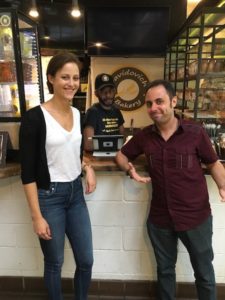 A bagel is a round bread, with a hole in the middle made of simple ingredients: high-gluten flour, yeast, salt, water, and malt. Its dough is boiled, then baked, and the result should be a rich caramel color. It should not be pale and blond. A bagel should weigh five ounces or less and should make a slight crackling sound when you bite into it. A bagel should be eaten warm and, ideally, should be no more than four to five hours old when consumed. All else is not a bagel.
A bagel is a round bread, with a hole in the middle made of simple ingredients: high-gluten flour, yeast, salt, water, and malt. Its dough is boiled, then baked, and the result should be a rich caramel color. It should not be pale and blond. A bagel should weigh five ounces or less and should make a slight crackling sound when you bite into it. A bagel should be eaten warm and, ideally, should be no more than four to five hours old when consumed. All else is not a bagel.
The bagel’s birthplace is considered to be Poland. A story popular in the United States is that the first bagel was produced as a tribute to Jan Sobieski, 17th Century King of Poland, after he saved Austria from Turkish invaders at the battle of Vienna in 1683. According to Maria Balinska, the author of “The Bagel: The Surprising History of a Modest Bread” (Yale University Press) it is just that-a story.

The first known reference to the bagel among Jews in Poland, according to Balinska, precedes the Battle of Vienna by seven decades. It is found, she says, in regulations issued in Yiddish in 1610 by the Jewish Council of Krakow outlining how much Jewish households were permitted to spend in celebrating the circumcision of a baby boy- “to avoid making Gentile neighbors envious, and also to make sure poorer Jews weren’t living above their means.”
Eastern European immigrants arriving in the United States at the turn of the 20thcentury brought the bagel with them to the streets of the Lower East Side. The rise of the bagel in New York in inextricably tied to that of the trade unions, specifically Bagel Bakers Local 338, a federation of nearly 300 bagel craftsmen formed in NYC in the early 1900s.
 Local 338 was, by all accounts, a tough and unswerving union. It was set up according to strict rules that limited new membership to the sons of current members. By 1915, it controlled 36 bagel bakeries in New York and New Jersey. These bakeries produced the original New York Bagels, the standard against which all others are still, in some manner judged.
Local 338 was, by all accounts, a tough and unswerving union. It was set up according to strict rules that limited new membership to the sons of current members. By 1915, it controlled 36 bagel bakeries in New York and New Jersey. These bakeries produced the original New York Bagels, the standard against which all others are still, in some manner judged.
What did they look like? They were a mere three ounces. They were smaller and denser than their modern descendants with a crustier exterior and chewier interior. They were made entirely by hand.
Local 338 held its ironclad grip on the bagel market for nearly half a century, until industrial bagel-making machines were introduced into the market in the early 1960s. The introduction of the bagel machines meant any retailer or bakery owner could make their own bagels with non-union help.
Today Davidovich Bagels are the links to the Old World bagels brought to the Lower East Side of New York. They are:
- Kosher-Pas Yisroel
- Retarded for 18-24 hours
- Hand Made
- Kettle Boiled
- Plank Baked
- Double Seeded
- All Natural
- Certified Made in NYC
and now for the modern World concerns
- Non-GMO Certified
- Vegan (except Egg)











 A bagel is a round bread, with a hole in the middle made of simple ingredients: high-gluten flour, yeast, salt, water, and malt. Its dough is boiled, then baked, and the result should be a rich caramel color. It should not be pale and blond. A bagel should weigh five ounces or less and should make a slight crackling sound when you bite into it. A bagel should be eaten warm and, ideally, should be no more than four to five hours old when consumed. All else is not a bagel.
A bagel is a round bread, with a hole in the middle made of simple ingredients: high-gluten flour, yeast, salt, water, and malt. Its dough is boiled, then baked, and the result should be a rich caramel color. It should not be pale and blond. A bagel should weigh five ounces or less and should make a slight crackling sound when you bite into it. A bagel should be eaten warm and, ideally, should be no more than four to five hours old when consumed. All else is not a bagel.
 Local 338 was, by all accounts, a tough and unswerving union. It was set up according to strict rules that limited new membership to the sons of current members. By 1915, it controlled 36 bagel bakeries in New York and New Jersey. These bakeries produced the original New York Bagels, the standard against which all others are still, in some manner judged.
Local 338 was, by all accounts, a tough and unswerving union. It was set up according to strict rules that limited new membership to the sons of current members. By 1915, it controlled 36 bagel bakeries in New York and New Jersey. These bakeries produced the original New York Bagels, the standard against which all others are still, in some manner judged.